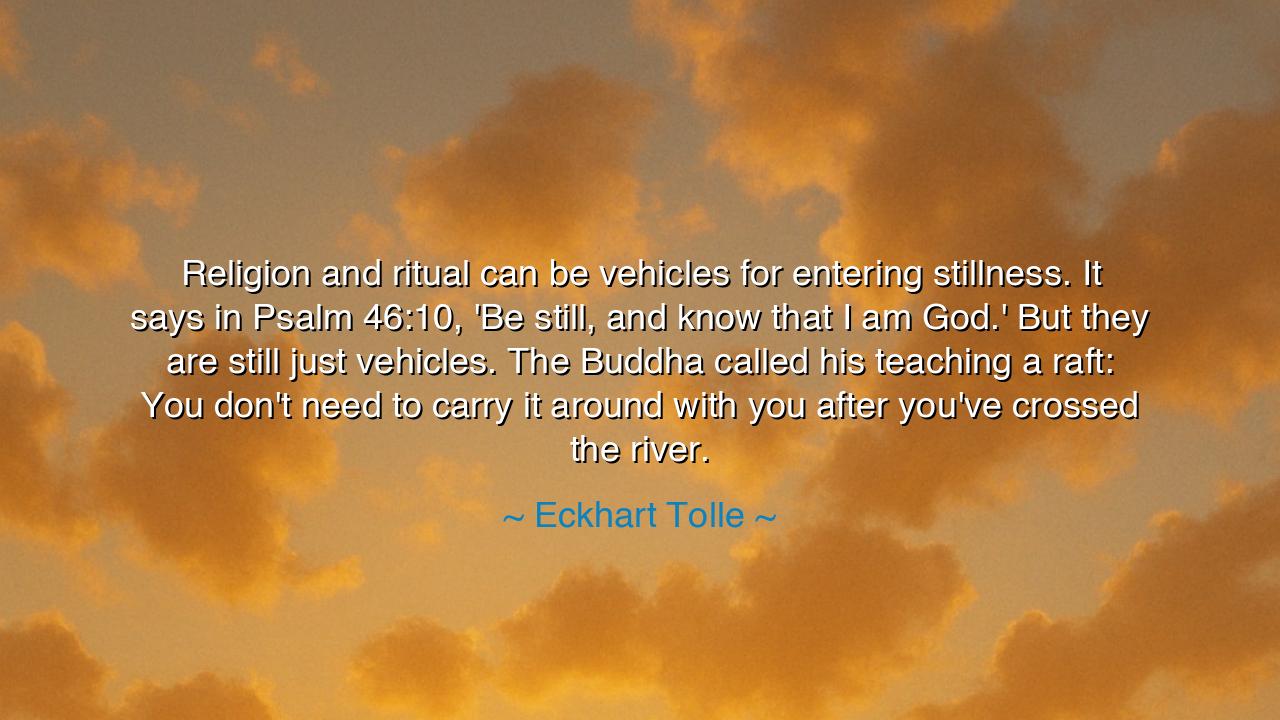
Religion and ritual can be vehicles for entering stillness. It
Religion and ritual can be vehicles for entering stillness. It says in Psalm 46:10, 'Be still, and know that I am God.' But they are still just vehicles. The Buddha called his teaching a raft: You don't need to carry it around with you after you've crossed the river.






“Religion and ritual can be vehicles for entering stillness. It says in Psalm 46:10, ‘Be still, and know that I am God.’ But they are still just vehicles. The Buddha called his teaching a raft: You don’t need to carry it around with you after you’ve crossed the river.” – Eckhart Tolle
In this teaching, Eckhart Tolle speaks with the voice of both prophet and mystic, echoing truths that span centuries and civilizations. He reminds us that religion and ritual are sacred paths — yet they are paths, not the destination. They are vehicles, means by which the seeker may enter the holy stillness that is the dwelling place of the divine. “Be still, and know that I am God,” says the Psalm — a command not to think, not to strive, but to be. The stillness is not found in the words, nor in the rituals themselves, but in the silence to which they point. The temple, the scripture, the prayer — all are doors. But to cling to the door is to forget to walk through it.
The Buddha’s raft, as Tolle recalls, carries the same message in another tongue. The Buddha, in his infinite clarity, compared his teaching to a raft that helps one cross the river of suffering. Once the other shore is reached, the wise man does not burden himself by carrying the raft upon his back — he leaves it behind. The raft served its purpose; its sacredness was in its use, not in its possession. So too with religion and ritual. They are holy not for their own sake, but because they awaken the heart to something greater — to the presence beyond form, to the stillness beyond words.
In the age of the ancients, this truth was often whispered among the wise, while the masses clung to forms and symbols. The priests built altars; the mystics tore them down within their hearts. For they knew that God does not dwell in stones or in chants, but in the silence between them. Yet the paradox remains — without the vehicle, few can find the way. Without the raft, one may never cross the river. Thus, religion and ritual are both necessary and transient: sacred tools for awakening, not treasures to be hoarded.
Consider the story of Ramakrishna, the Indian saint who worshipped the goddess Kali with unshakable devotion. Each day he sang and wept before her image, burning with divine love. But one day, as he gazed upon the statue, a vision overcame him — he saw that Kali was not a form, but the formless, not an image, but infinity itself. Overcome by ecstasy, he shattered the statue that had once been his world. Not out of disrespect, but out of realization. He had crossed the river; the raft had served its purpose. This was not the death of religion, but its fulfillment — for true faith is the dissolving of all boundaries between the worshiper and the worshiped.
Tolle’s wisdom, then, is not a rejection of faith but a call to deepen it. He honors ritual as the ancient language of the soul, but warns that its power fades when the heart clings to the form and forgets the essence. To repeat prayers without presence is to drift endlessly upon the river, mistaking motion for progress. But to enter stillness, to feel the divine pulse beneath all words, is to awaken into direct communion with what the Psalmist called “God” and the Buddha called “Nirvana.” The names differ, but the silence is the same.
The lesson is clear: cherish the vehicles that carry you toward awakening — your prayers, your chants, your meditations — but do not mistake them for the destination. When stillness arises within you, when the veil lifts and you sense the living presence that breathes through all things, let go of the raft. Do not worship the form that led you there; instead, honor the formless by living in awareness.
In your own life, practice presence in every act. When you pray, let your words be alive with attention. When you meditate, let silence bloom without effort. When you walk, eat, or breathe, remember: each moment is an altar. Religion and ritual can open the gate, but only stillness will lead you through. And when you reach that sacred shore — when you know, not through thought but through being, that the divine has always been within you — you will smile, and gently set down the raft.
Thus the teaching completes itself: the path is holy, but the stillness is eternal. To cling to the path is to remain a traveler; to rest in stillness is to arrive home.






AAdministratorAdministrator
Welcome, honored guests. Please leave a comment, we will respond soon